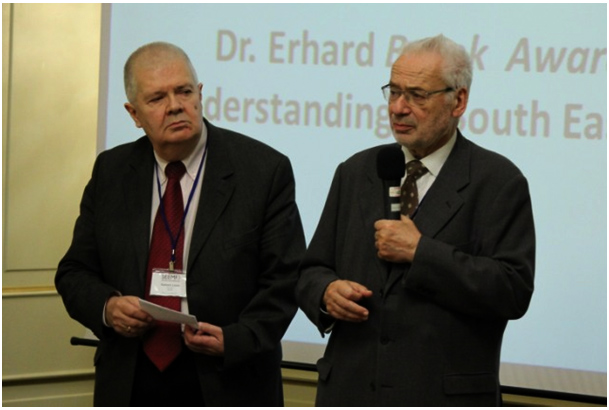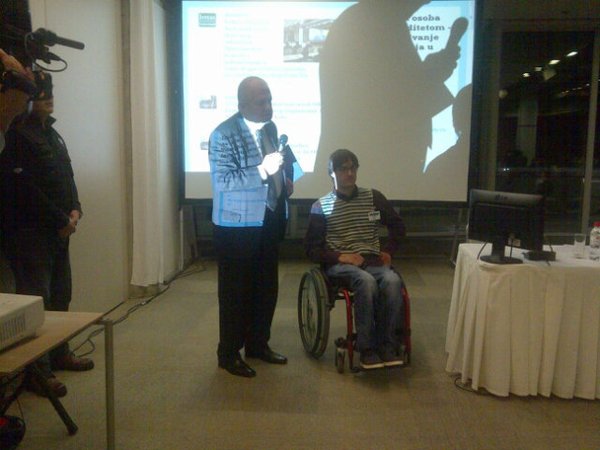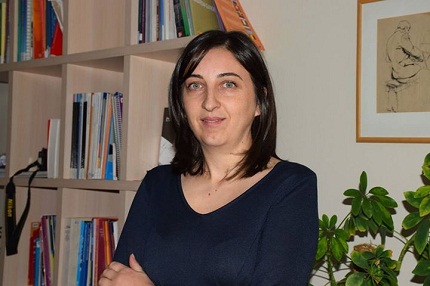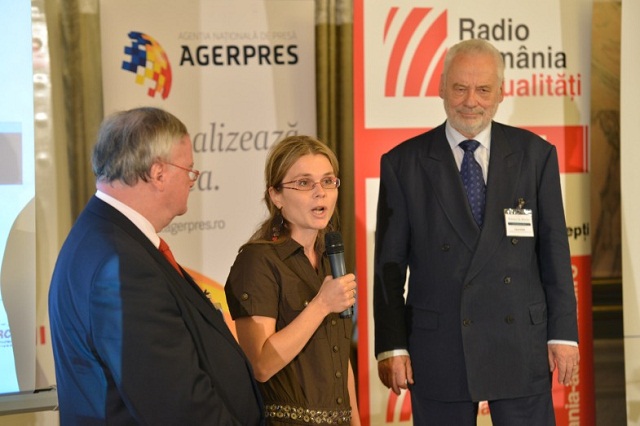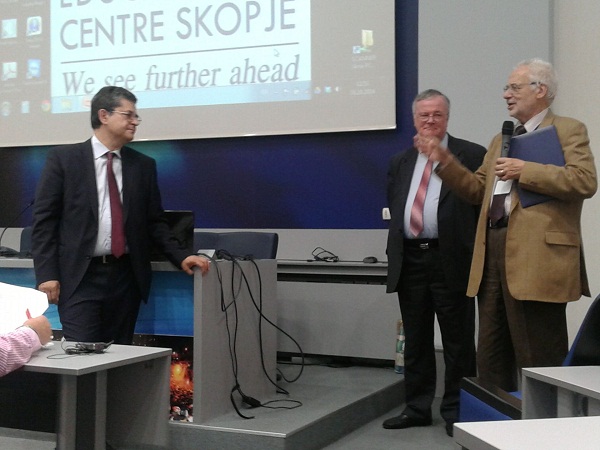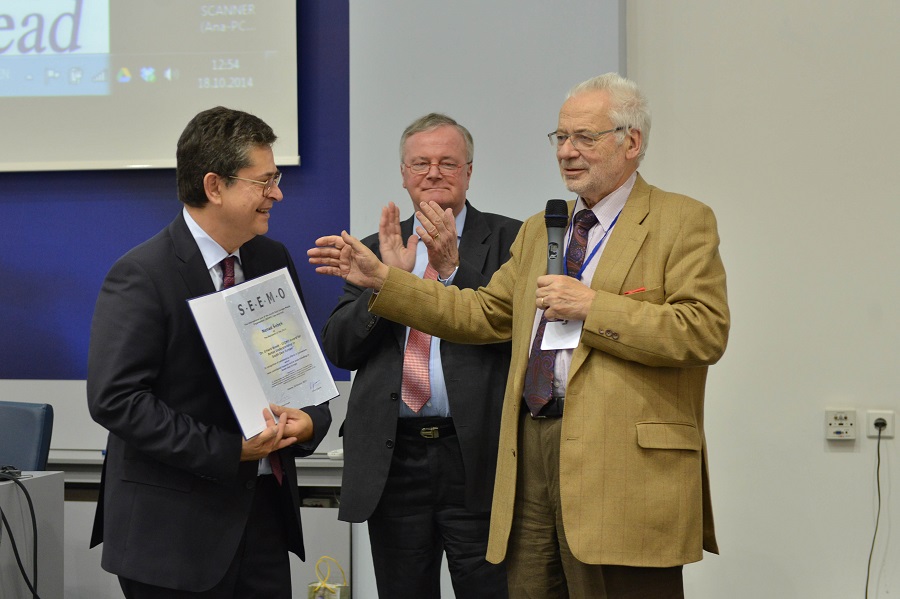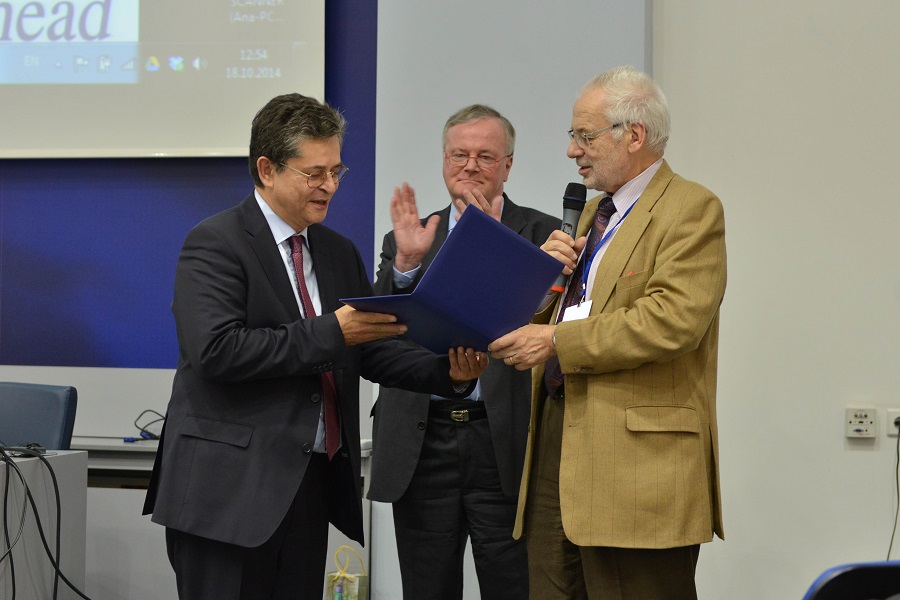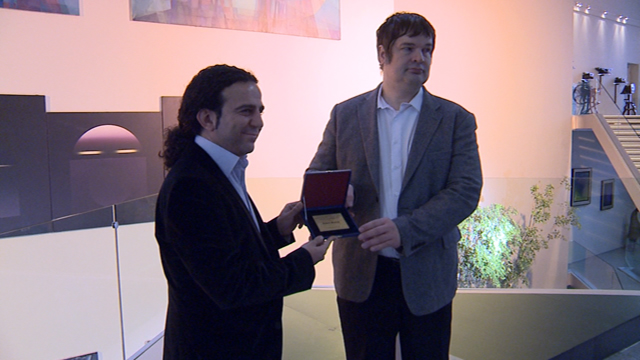The South East Europe Media Organisation (SEEMO), organised together with South East and Central Europe PR Organisation (SECEPRO) and International Academy – International Media Center (IA-IMC), as also additional partners, a one-day conference on press freedom, the influence of politics on media, and corruption on 23 September 2014 in Bucharest, Romania.
The event was open by Romanian Prime Minister Victor Ponta and by Dr. Erhard Busek, who is coordinator of the South-Eastern Cooperative Initiative (SECI), chairman of the Institute for the Danube Region and Central Europe, former special co-ordinator of the Stability Pact for South Eastern Europe and former vice chancellor of Austria. SEEMO Secretary-General Oliver Vujovic and Marina Constantinoiu, president of SEEMO in Romania and editor in chief of the Romanian daily Jurnalul National, together with Valeriu Zgonea, president of the Chamber of Deputies of Romania, welcomed the participants. More than 150 media representatives from Romania, as also guests from abroad participated.
Željka Lekić-Subašić is the winner of the 2014 Dr. Erhard Busek – SEEMO Award for Better Understanding in South East Europe.
The Vienna-based South East Europe Media Organisation (SEEMO), an affiliate of the International Press Institute (IPI), has announced that Željka Lekić-Subašić, head of the Eurovision News Exchange for South East Europe (ERNO), is the winner of the 2014 Dr. Erhard Busek – SEEMO Award for Better Understanding in South East Europe.
In addition, Nenad Šebek, spokesman for the Regional Cooperation Council (RCC) has been honoured with a special Dr. Erhard Busek – SEEMO Diploma for Better Understanding in South East Europe.
The SEEMO jury chose Lekić-Subašić and Šebek for the awards based on their outstanding contribution to the process of democratisation and better understanding in South East Europe.
The award to Lekić-Subašić, which carries a cash prize of €2,000, is scheduled to be presented on Sept. 23, 2014 in Bucharest, while the diploma-award to Šebek, which carries a cash prize of €1,500, is scheduled to be presented on Oct. 18, 2014 in Skopje by Dr. Erhard Busek, president of the Institute for the Danube Region and Central Europe.
Address by PM Victor Ponta at the Conference on press freedom, organized by South East Europe Media Organisation (SEEMO)
Good morning,
I should start with an apology, if you are to blame someone for this very early start time of the conference; I am ready to take responsibility. I talked to the organizers; I wanted very much to attend even the opening. Immediately after that meeting, I will fly to New York, where the UN General Assembly takes place and where I will be. I am part of the politicians who have more energy at some more customary hours, but at eight and half, I can nevertheless express some ideas relative to an important topic, a topic that should always be debated in a democratic society, and a topic that is not uneventful and lacking surprises in Romania, to confer it peculiarity. I thought if the organizers knew about …some three or four months ago, you told me about the event – if you knew that two-three days before the conference, there will be a series of events and all kind of disclosures, and unprecedented events related to press and the role of the press in a democratic society.
I would like to tell two-three principled things, the first, it is obvious for any democratic society that mass-media is needed alike justice is needed, that, in Romania, the mass-media is diverse, first of all, I would say that one cannot say that the press in Romania has only one orientation – I refer to the media commenting politics, I guess this is the topic – not the tabloid press, the economic press or …the press involved in the presentation and comment of political events. Therefore, Romania is a country of huge diversity. Whenever I meet with counterparts, prime ministers in Europe and elsewhere, and they ask how many news tv stations are in Romania, because they see a lot of cameras, and I say, “Just five.” “How five? ‘” Five. ‘”24 hours of 24 politics?” “Yes.” And everybody say, “I think you have a very hard life as Prime Minister.,” I reply: “No. I have an easy life, because I know exactly what all five stations report, following my visit. “Same event will be presented in very different ways, as if we were talking about different events, but in the end, diversity is in my opinion, the most important win of the media in Romania, and it is the most important gain of public people, because you can never have an opinion that is not reported by anyone. So from that perspective, I think Romania is a happy case of extremely diverse media and presentation of all points of view.
Secondly, I had been told by my advisers before coming to this meeting, a quote from one of the founding fathers of the United States, saying that if I should decide between a government without press and a press without government, I would not hesitate a single moment to prefer a press without Government. I thought that politicians say things I do not believe all the time. Therefore, I do not think or I do not know, perhaps there are, politicians who like to be criticized, but I think that all, or most of politicians, understand the need of such a press, and my first message is that the mass-media in a democratic country should change all the time, to keep up with the change of society, but not to wait for this change to come from the political area, because inevitably, the political class is subjective and it will be in no case a promoter of change. I think that mass-media has the power in Romania too to change from inside, and to be as least as possible careful at the outside influences.
Thirdly: Inevitably, in electoral political moments, there is a polarization of the political scene, and sometimes a polarization of mass-media.
Fourthly, there are indeed specific problems of the relationship between politics and mass-media in Romania, between public institutions and mass-media, problems that I think that the Romanian society can solve. The first problem referred to how free indeed are certain journalists, and I think it is time, in Romania, every time a regime is changed and all unknown things surface, or we knew them but we did not want to believe, if I am to use a medical term, all “pus” in society gets out, and I am sure that the cure will intervene. Obviously, there is a painful operation, from where we should learn for the future, but there are in all walks of life, of the Romanian society people who pretend they are independent, and they are not, people who pretend they represent ethics, and they are not, people who have played roles. And it is good that we find them on this occasion, of the change of political regime, we discover those who were not journalists but were only servants of a political regime. I truly believe that the journalist is one who does not serve a political regime and therefore does not need of release at some point; there are those who remain critical of anyone breaking the rules for the exercise of a public office. And that was seen. There is a point about what the unseen of journalism means, that support or need of financial support.
I was very, very shocked and worried when I saw that criminal proceedings related to the offense – I am not allowed, nor do I intend to comment – have an impact on the lives of journalists and media institutions. The fact that a media owner is convicted of a criminal offense is something that happens in the justice system, but to confiscate press offices and put physical pressure on media institutions is something that has not happened in Romania in 25 years and I think it should be a huge sign of concern. More worrying was the fact that other part of media enjoyed and I thought how many times we are happy believing that it can never be our turn, and perhaps we should think when something bad and unfair happens to someone else, even if it is not a friend of ours, that solidarity is definitely the best thing. The second thing is the power that some media owners fancy having, and I watched certainly the case of Great Britain where media owners influence in politics was debated so much. In Romania, we still have to get there. As Prime Minister, I said very clearly how I was blackmailed by a media owner who told me that he made all presidents up to now and if I want him to make me President too, then, I should spare him from paying taxes. Ever since I told him I am not interested in his offer, and I would like him to pay taxes, I am the main subject of the attacks coming from that media trust. He will nevertheless be obliged to pay taxes, if not, he will suffer the rigors of the law, irrespective of the impact that most of attacks, unfair ones on the one who asks him to pay his taxes. In this respect, I think that mass-media should set the example. You cannot ask politicians or people in society who do not observe the legal obligations, you being the first to infringe them. How to criticize a Government for not using well revenues from taxes, if you do not pay them? Surely, we should discuss to what extent the state backs a development of mass-media irrespective of financial resources, but I think that nobody of the correct journalists, correct investors has ever asked not to pay taxes, as a way to develop the relationship between mass-media and politics. There are things very much in connection to Romania, but which, I think, as far as I know, exist in many countries in the region where we are living. Anyhow, I am absolutely convinced that regarding the independence, diversity and power of mass-media, Romania is a far better case than other countries in the region, and that, in the future, surely, the change for the better that the entire Romanian society needs, including mass-media, will come from within the journalists, and not so much from politicians. I think that a real discussion of journalists with journalists about what is really happening in the press, the problems that need to be resolved, is absolutely necessary and I am convinced that after we finish this very early moment, you can reach much better conclusions, without for the politicians to be in the room. I thank you for the invitation and I assure you that I will stoically assume everything in a politician job description!
Thank you
Speakers
Erik Csernovitz, deputy secretary general of the Central European Initiative (CEI)
Joan Barata Mir, principal adviser in the Office of the OSCE Representative on Freedom of the Media, based in Vienna
Renate Schroeder, director of the European Federation of Journalists (EFJ)
Ognian Zlatev, head of the European Commission Representation in Bulgaria
Vincenzo Le Voci, secretary-general of the EU’s “Club of Venice”
Sasa Lekovic, a long-time Croatian journalist and investigative reporter working in South-East Europe Mitja Mersol, a Slovenian politician and former editor-in-chief of the daily Delo
Steven M. Ellis, IPI senior press freedom adviser; Boris Bergant, former deputy director general of RTV Slovenia and former vice-president of the European Broadcasting Union (EBU)
Ross Biggam, director general of the Association of Commercial Television in Europe (ACT).

